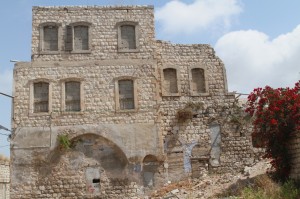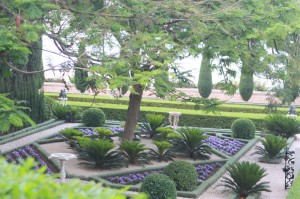Guest blog by Gerri Haynes: The medical delegation heads for home
As she did last year, Gerri has organized a Washington Physicians for Social Responsibility delegation of doctors and other health care providers to work in hospitals and clinics in Gaza in an effort to directly help the people there and to bring attention to the ongoing humanitarian crisis that the Israeli blockade has created. She has been sending back reports from inside and outside the Israeli blockade. This is her final post before returning to the United States. (While her flight was delayed in New York, Gerri added to this post.)
This morning, we traveled early to Haifa to attend the first part of a conference addressing a one-state solution. We met colleagues from Physicians for Human Rights, Israel, and learned of the work they are doing. Their representative, Sameeh, told us that PHR’s main objective is to get good access to health services for the West Bank and Gaza.
Sameeh described the difficulties in getting people to services – sometimes requiring that patients be taken long distances “out of the way” to get to nearby facilities that are almost inaccessible because of the separation Wall.

The Old City in Haifa. (Bob Haynes photo)
Almost 48% of agriculture land in Gaza is not workable. The land in the buffer zone is not accessible and bombing has made much of the earth unsafe to farm. Most importantly, water is a critical issue in Gaza.
Sameeh reported that 95% of the water is contaminated and 80% of drinking water is privately supplied – an economic disaster. Many of the wells have been bombed. NGOs report that because of the contamination of the water, the growth of children is stunted. There will be an ongoing study by PHR on these issues.
Comments on a one-state solution varied from the hope for this possibility to an opinion that such a state already exists – but that many of the citizens (West Bank, Gaza and Palestinian Israelis) have few or limited rights.
During our visit to this region, we have heard many opinions about solutions to the current untenable divisions – with the majority of commentators to our group holding that a one-state solution is impossible and a two-state solution is a distant hope.

The Bahai Gardens in Haifa. (Bob Haynes photo)
We will fly home tonight – again grateful for this time and the wonderful people we know here.
(Here is Gerri’s add from New York.)
Hello from New York – Our plane will be a little late and I want to complete this blog with this message from a lovely 23-year-old woman from Gaza. Sahar is an interpreter and teacher and she sends this message to all:
Dear people on the other side of the land,
I am writing to yourselves from Gaza where insecurity and uncertainty and a second war, in every moment, is expected.
I write this and I am aware and sad that on the other side of the land, Palestinian rockets are expected, too. This needs to come to an end.
I, and most of my people, believe that people everywhere, regardless of their religious, political, cultural and social state, are entitled to peace and love; respect and dignity. You, the same as we, are entitled to a decent, safe life that no one on the planet has the right to violate and spoil.
If you believe in the above mentioned, you are my partner to start the first step towards peace, comprehensive and endurable for all.
May peace and love come to the world and to you,
Sahar Salem, Gaza, Occupied Palestinian Territories
RSS feed for comments on this post. TrackBack URI